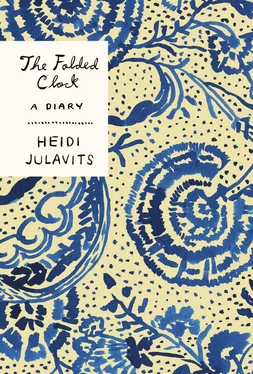Disease is not an accident, not even fate, and certainly not evil intention of the love of God. Disease is the result of our own homemade error on mental and physical level. Only if you are willing to correct mistakes by yourself, you are also ready to be healthy again .
We were willing to correct mistakes! We were ready to be healthy again! We clicked another link that informed us: bitter apricot kernels were what we’d bought. Bitter apricot kernels, we learned from “the official website of vitamin B 12” are no plain nut, and maybe not even a food; primarily they are a hotly contested alternative cancer therapy. According to some people, bitter apricot kernels are poisonous. They contain cyanide. Because of this, the recommended daily dosage is one to two nuts. My husband had eaten fourteen.
I reasoned with him. I am committed to reasoning away his illness and his pain (in the same way that I am committed to reasoning him out of the diet beliefs he maintains for the sake of his health). I can expertly talk him out of experiencing what he believes he experiences and maybe even experiences.
Fortunately, illness is almost always illogical. I exploit the holes.
“It says here,” I said, reading from another website, “that while the UK believes consuming anything over two to three bitter apricot kernels means you’ll die of cyanide poisoning, the Hunzas…” Wait. Who were the Hunzas? They sounded like a sci-fi tribe of distant planetary origin whose digestive systems would not resemble our own. I did some quick rewriting in my head. “I mean, the people in, like, Afghanistan who harvest these nuts eat dozens and dozens a day.”
This fact did not assuage either of us.
“Look at this bag,” I said. I fake almost dropped it. The bag was so heavy! It weighed 500 grams! “If you could eat only two to three nuts a day, this bag would last ten years. Also why would they sell a bag this big without a warning?”
Together we examined the packaging. There were a lot of words on the label, and, granted, we did not know what any of them meant, but, I reminded him, we knew what warnings looked like. There was nothing visually alarmist about the label at all. There was nothing to indicate that this was a bag of death. There were pictures of blossoms . Which I suppose could be meant in the funereal sense, the death-and-rebirth sense. I recalled a book about nuclear waste buried in a mountain, and how the waste’s deathly potency would outlast the English language. The officials in charge of responsibly protecting the people of the future from the toxic waste did not know how, in the absence of language, to warn these people not to disturb the mountain. They experimented with pictures and symbols. What might constitute a pictorially or symbolically timeless death warning? Maybe blossoms.
“Also,” I said, “there’s no way the Germans would have bags of cyanide on the grocery store shelves.” Anything in Germany that might remind a person of WWII has been either eradicated from view or memorialized by a huge stone monument. Hitler killed himself with cyanide. There’s no way the Germans would put an unmarked (i.e., unmemorialized) bag of cyanide on the grocery shelves, not least because we’d bought the aprikosenkerne at the Kaiser’s grocery store that was located less than a kilometer from the Wannsee Conference house.
I’m sorry, but tell me the Germans had not thought about this.
It made me wish, however, that we’d come up with a list of ways we might die in Germany that would permit us to laugh at each other’s funerals. I had a boyfriend with dark-humored brothers who generated such lists. When my boyfriend moved to Japan to study the Japanese sword, he gave his brothers permission to laugh at his funeral if he (a) died eating blowfish or (b) accidentally hari-kari-ed himself with his own weapon.
Surely the unintentional cyanide overdose of a half-Jew in Wannsee would qualify as grounds for laughing.
Meanwhile, my husband was upstairs trying to work. I called up the staircase.
“Are you dead yet?”
He said he felt nauseous.
“Me too,” I said cheerfully. “I’m so tired right now I’m sick!” It was true. We were still not over our jet lag.
Later he came downstairs for lunch and complained of a headache.
“We haven’t been drinking much water,” I said. “You’re probably dehydrated!”
It’s kind of him to tolerate my optimism. Who knows what will happen when we’re older, when he’s really dying of cancer or something. Or if we’re in a car accident. I imagined myself after a car accident reasoning with his decapitated body. You’ll be fine, you’re just dehydrated! The Hunzas grow new heads by the dozens! What it comes down to is this: I just need him to believe me that he’s not going to die. I need to win this fight more than any of the others I’ve won, so that I can prove to us both that I’m right.
Today I stopped at an antiques store that I’ve passed many times but have never visited. A sign outside advertised HAND STICHED QUILTS. Three quilts hung from a clothesline; none of them looked antique. The wooden boat building industry in my town has a name for this new-old crafts pursuit. Boats based on old designs and built with new methods are called “Spirit of Tradition” boats. So maybe these were Spirit of Tradition quilts. In the spirit of tradition — honoring ye olde days — these quilts were “stiched,” not stitched.
The quilts should have been a warning sign: this was not my kind of antique store. Flanking the door were architectural ruins — the bases of giant pillars — already repurposed as planters. This store catered to people who pay others to find the promise in junk. I do not think less of these people; I just cannot afford to be one of them. I often buy things because they are cheap and because I hope they will jar my imagination at a later date and become a smart investment. They will prove useful for something. Those cast-iron boot removers, for example, that were once bolted to a barn wall, and into which a farmer once stuck his boot heel and levered out his foot. They’ve spent ten years on top of my woodstove; their use has not yet revealed itself to me. I trust in time that it will.
I went inside the antiques store. Indeed, the prices were too high. My desires recalibrate in such situations; I am open to liking whatever is simply within my price range. I found a box of old postcards, the long rectangular ones with the twin, side-by-side exposures, usually of national monuments or state parks. When I asked the prices, the man said offhandedly, as though these items were of little consequence to him, “Oh those, I just put those out. I haven’t had a chance to price them yet.”
But approximately, I asked him. I wanted to know if it would be worth my time to paw.
“Anywhere from $5 to $200, depending on the postcard,” he said.
I picked five postcards. The four Maine postcards were too expensive. The fifth — a waterfall in Minnesota, an unremarkable image of a place that meant nothing to me — was five dollars. I bought it.
I gave the man my credit card. He scrutinized my name. “The writer?” he asked. He said he liked my work, but I doubt he’d read any of it. He knew my name because his real trade was people. Antiques interested him because they were the former possessions of people. Our subsequent conversation confirmed my suspicion. I told him I was sad because I was soon returning to New York. He said, “Yes, all of the New Yorkers leave in August.” He sounded wistful. Most locals, by the end of a summer tourist season, do not respond wistfully to its conclusion.
The man dropped names of local summer people, some of whom I’d heard of, none of whom I knew. He told me about a thirty-years-dead real estate agent who was, as he put it, “a one-woman zoning committee.” (He also described her as a “prissy little woman.”) She had ideas about where each type of person (writer, artist, WASP, Irish Catholic) should live. I mentioned a snooty family in our town called the Winfrieds. (I’d been inside their house once because I knew their caretaker.) I told a story about Mrs. Winfried and how she’d snubbed my neighbor, a local woman who’d cleaned Mrs. Winfried’s house when she was a teenager.
Читать дальше












